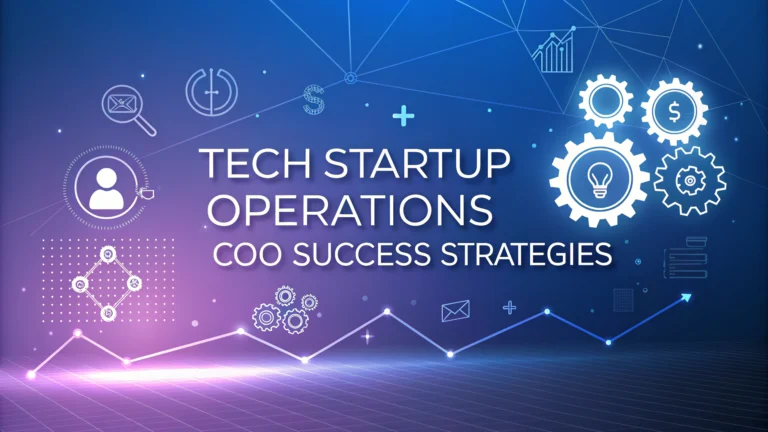A successful tech startup COO balances strategic leadership with hands-on operational management to drive sustainable growth.
This guide explores proven strategies for tech startup COOs, drawing from real-world experiences and practical approaches that work in fast-paced environments.
Whether you’re a new COO or seeking to improve your effectiveness, these actionable insights will help optimize your startup’s operations and scale efficiently.
Key Responsibilities of a Tech Startup COO
- Implementing and overseeing operational systems
- Managing cross-functional teams
- Developing scalable processes
- Optimizing resource allocation
- Supporting the CEO’s vision
- Driving performance metrics
Essential Skills for Tech Startup COOs
| Skill Category | Specific Competencies |
|---|---|
| Technical | Project management, data analysis, tech stack understanding |
| Leadership | Team building, conflict resolution, strategic planning |
| Business | Financial modeling, market analysis, resource optimization |
Operational Framework Development
Start by mapping current processes and identifying bottlenecks through systematic analysis.
Create standardized operating procedures (SOPs) that can scale with company growth.
- Document workflows and best practices
- Implement automation where possible
- Establish clear KPIs
- Design reporting structures
Team Management Strategies
Build cross-functional teams that align with company objectives and culture.
Effective Team Structure:
- Clear roles and responsibilities
- Direct reporting lines
- Regular performance reviews
- Career development paths
Resource Optimization
Maximize startup resources through strategic allocation and monitoring.
- Budget management and forecasting
- Vendor relationship management
- Technology stack optimization
- Hiring and training programs
Growth Management Tools
Select and implement tools that support scalable operations.
Recommended Tools:
- Project Management: Jira, Asana, or Monday.com
- Communication: Slack, Microsoft Teams
- Analytics: Tableau, Power BI
- Documentation: Notion, Confluence
Risk Management and Compliance
Develop robust risk management protocols to protect the startup.
- Regular security audits
- Compliance monitoring
- Crisis management plans
- Insurance coverage review
Moving Forward: Your Action Plan
Set clear 30-60-90 day objectives for implementing these strategies.
Create measurable goals and track progress through defined metrics.
Build relationships with other startup COOs through networks like Startup Grind and Y Combinator.
Scaling Operations Excellence
Implement continuous improvement cycles to refine operational processes as the startup grows.
- Regular process audits
- Feedback loops implementation
- Performance optimization
- Scalability assessments
Strategic Partnership Development
Foster relationships that enhance operational capabilities and market reach.
Partnership Focus Areas:
- Technology providers
- Service vendors
- Industry collaborators
- Research institutions
Data-Driven Decision Making
Leverage analytics to guide operational strategy and execution.
- Performance metrics tracking
- Predictive analytics implementation
- Customer behavior analysis
- Resource utilization monitoring
Innovation Management
Balance operational stability with innovation initiatives.
Key Innovation Areas:
- Process automation
- Technology adoption
- Team empowerment
- Market adaptation
Empowering Operational Excellence
Success as a tech startup COO requires balancing strategic vision with tactical execution. Focus on building scalable systems, empowering teams, and maintaining operational agility.
Remember that operational excellence is an ongoing journey. Continuously evaluate and adjust your approach based on company growth, market conditions, and emerging technologies.
Connect with industry peers, stay updated on best practices, and maintain a learning mindset to drive sustainable success in your role as COO.
FAQs
- What is the primary role of a COO in a tech startup?
A COO in a tech startup is responsible for overseeing daily operations, implementing business strategies, managing team performance, and ensuring operational efficiency while working closely with the CEO to achieve company goals. - How does a startup COO differ from a COO in an established company?
A startup COO typically wears multiple hats, handles more hands-on tasks, and needs to be more adaptable to rapid changes. They often focus on building systems from scratch rather than managing existing ones, and must be comfortable with uncertainty and limited resources. - What are the key metrics a tech startup COO should track?
Essential metrics include burn rate, customer acquisition cost (CAC), lifetime value (LTV), monthly recurring revenue (MRR), employee productivity, operational costs, customer churn rate, and team performance indicators. - How should a COO structure the organizational hierarchy in a growing tech startup?
The organizational structure should be flat initially, with clear reporting lines, cross-functional teams, and adaptable roles. As the company grows, implement department heads, team leads, and specialized positions while maintaining agility. - What technology systems should a startup COO prioritize implementing?
Priority systems include project management tools, communication platforms, HR management systems, customer relationship management (CRM) software, financial tracking tools, and data analytics platforms. - How can a COO effectively manage cash flow in a tech startup?
Focus on optimizing operational costs, implementing proper budgeting systems, monitoring expense allocation, maintaining adequate runway, and establishing clear financial controls and reporting processes. - What are the most important relationships a COO needs to maintain in a tech startup?
Critical relationships include those with the CEO, department heads, key employees, investors, vendors, strategic partners, and customers. Regular communication and alignment with these stakeholders is essential. - How should a COO approach scaling operations in a tech startup?
Scale operations by creating repeatable processes, documenting procedures, implementing automation where possible, hiring strategically, maintaining quality control, and ensuring systems can handle increased volume without breaking. - What risk management strategies should a startup COO implement?
Develop contingency plans, maintain compliance standards, implement cybersecurity measures, create backup systems, establish legal protections, and regularly assess and mitigate operational risks. - How can a COO build and maintain a strong company culture during rapid growth?
Establish clear company values, implement consistent communication practices, create employee engagement programs, maintain transparency, recognize achievements, and ensure cultural fit in hiring decisions.
